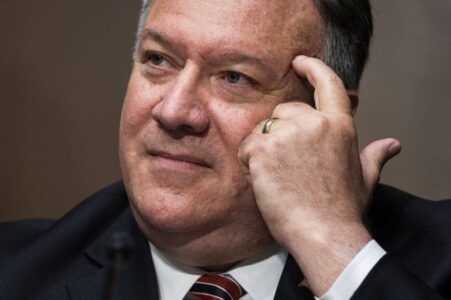
U.S. authorities target al-Shabaab leaders with terrorist designations
The Trump administration has sanctioned two leaders of the Somalia-based al-Shabab as part of its efforts to dismantle the al-Qaida-affiliated terrorist organization.
U.S. Secretary of State Mike Pompeo announced Tuesday that Abdullahi Osman Mohamed and Maalim Ayman, senior leaders of al-Shabab, have been blacklisted as Specially Designated Global Terrorists. The designations bar them from the U.S. financial system and U.S. citizens from conducting business with them as well as freezing any assets or property they might have in the United States.
“The U.S. is committed to degrading and defeating this dangerous al-Qaida affiliate,” Pompeo said via Twitter.
The State Department said Mohamed, who is also known as Engineer Ismail, is an explosives expert who manages al-Shabab’s manufacturing of explosives and its explosives operations. He is also a special advisor to al-Shabab’s “emir” and is the leader of its media wing, al-Kataib.
Ayman is the leader of the Jaysh Ayman unit that conducts attacks and operations in Kenya and Somalia, the State Department said, accusing him of being behind the January attack on Camp Simba that killed one U.S. soldier and two American contractors.
“The U.S. government is committed to disrupting the illicit financing methods of al-Shabab, limiting its ability to conduct further attacks against civilians and supporting the federal government of Somalia in disrupting terrorism finance,” Pompeo said. “Addressing the al-Shabab threat will require working closely with our partners to degrade the terrorist group’s capacity and operations, combatting its control and influence in East Africa.”
The United States designated al-Shabab as a terrorist organization in 2008.
Nathan A. Sales, coordinator for Counterterrorism at the U.S. State Department, told reporters Tuesday during a briefing on the designations that al-Shabab is one of the most dangerous affiliates of al-Qaida in the world, and that since 2008 the group has killed hundreds of people throughout East Africa, including more than 500 people with a truck bomb attack in Mogadishu in 2017.
“We took the action we took today because we see a threat to U.S. national security interests that is posed by al-Shabab, and we’re going to continue to use the tools entrusted to us to advance American values and interests,” he said. “And that will remain our commitment for as long as we have the privileged of serving the American people.”
Asked what affect the sanctions will have on the terrorist group despite the possibility it may not have any U.S. assets, Sales defended the action by saying the United States will will use every weapon in their arsenal to hinder al-Shabab’s ability to generate funds.
“Whether or not they have assets in the United States, sanctions have very powerful secondary consequences because it makes it that much harder for designated individuals or organizations to try and move money through the international financial system,” he said.
Source: UPI





